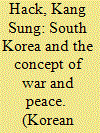| Srl | Item |
| 1 |
ID:
094971


|
|
|
|
|
| Publication |
2010.
|
| Summary/Abstract |
The international system of the Eastern Zhou has long held a fascination for international relations theorists. Like Europe in the 18th and 19th centuries it had a small number of great powers interacting over a single cultural space. Thus it presents another sandbox in which to test theories of international relations using historical data. Pre-Qin China is both a rich source of data for international relations specialists and a rich source of analytical insight. The work of Han Fei, Mo Di or Mencius is at least equal in value to that of Thucydides in the Western canon. The added value of pre-Qin China is that we have an independently authored set of historical texts that lay out the narrative of inter-state relations in ways that allow us to independently evaluate the relationship of data to interpretation and analysis. This allows us to place modern scientific analytic frames around the interpretive propositions of pre-Qin thinkers, and independently evaluate the data in that light. We are also able to reconstruct the interpretive frames of pre-Qin thinkers in ways that correspond more closely to scientific methodology. We must be careful, however, not to identify our reconstructed frames that draw heavily on the received body of scientific discourse, with the original frameworks proposed by pre-Qin thinkers. What we should be looking for is neither how modern practice validates the insights of pre-Qin thinkers, nor how pre-Qin thinkers anticipate modern scientific theory. The latter form of anachronistic theorizing may be satisfying for nationalist ideologists or for parlor-room discussion, but has no place in scientific discourse.
|
|
|
|
|
|
|
|
|
|
|
|
|
|
|
|
| 2 |
ID:
125250


|
|
|
|
|
| Publication |
2013.
|
| Summary/Abstract |
does Confucianism account for any part of the perceptions of international politics that Korean possess? if it does, then how significant has its influence been on the historical process of the conceptual formation of Korean's concepts of war and peace? first learned over two millennia ago, Confucianism finally become the sole ruling ideology under the Joseon Dynasty. Ever since, Confucian virtues moralistic approach, education of men, and family like international order with the middle kingdom at the centre, among many played dominant roles in Korean domestic politics as well as it foreign relations (Sino-Korea relations, almost exclusively). what seemed to last forever in East Asia, however confronted a massive challenge an the fate of Koreans was not exception. Korea's bandwagoing strategy within the Confucian world order could not function nay more with the advent of the age of imperialism and the subsequent foreign penetrations.
|
|
|
|
|
|
|
|
|
|
|
|
|
|
|
|